高中英语语法通霸第一二讲
- 格式:docx
- 大小:36.61 KB
- 文档页数:15
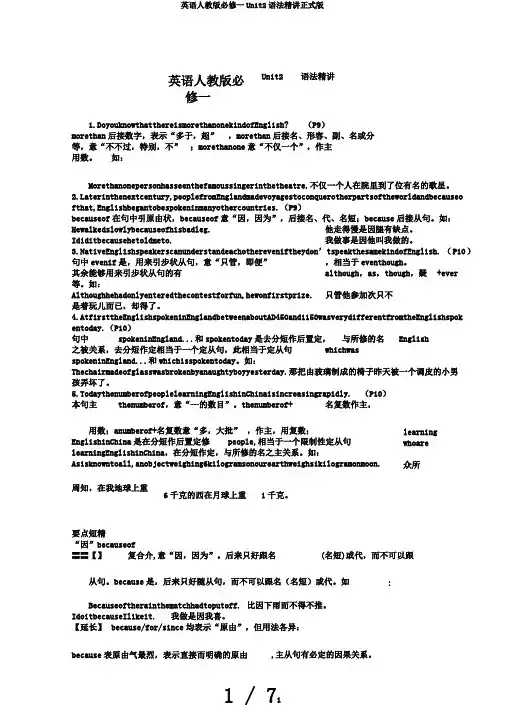
英语人教版必修一Unit2语法精讲1.DoyouknowthatthereismorethanonekindofEnglish? (P9)morethan后接数字,表示“多于,超”,morethan后接名、形容、副、名或分等,意“不不过,特别,不”;morethanone意“不仅一个”,作主用数。
如:Morethanonepersonhasseenthefamoussingerinthetheatre.不仅一个人在院里到了位有名的歌星。
terinthenextcentury,peoplefromEnglandmadevoyagestoconquerotherpartsoftheworldandbecauseo fthat,Englishbegantobespokeninmanyothercountries.(P9)becauseof在句中引原由状,becauseof意“因,因为”,后接名、代、名短;because后接从句。
如:Hewalkedslowlybecauseofhisbadleg. 他走得慢是因腿有缺点。
Ididitbecausehetoldmeto. 我做事是因他叫我做的。
3.N ativeEnglishspeakerscanunderstandeachothereveniftheydon’tspeakthesamekindofEnglish.(P10)句中evenif是,用来引步状从句,意“只管,即便”,相当于eventhough。
其余能够用来引步状从句的有although,as,though,疑+ever 等。
如:Althoughhehadonlyenteredthecontestforfun,hewonfirstprize. 只管他参加次只不是着玩儿而已,却得了。
4.AtfirsttheEnglishspokeninEnglandbetweenaboutAD450and1150wasverydifferentfromtheEnglishspok entoday.(P10)句中spokeninEngland...和spokentoday是去分短作后置定,与所修的名English之被关系,去分短作定相当于一个定从句,此相当于定从句whichwasspokeninEngland...和whichisspokentoday。
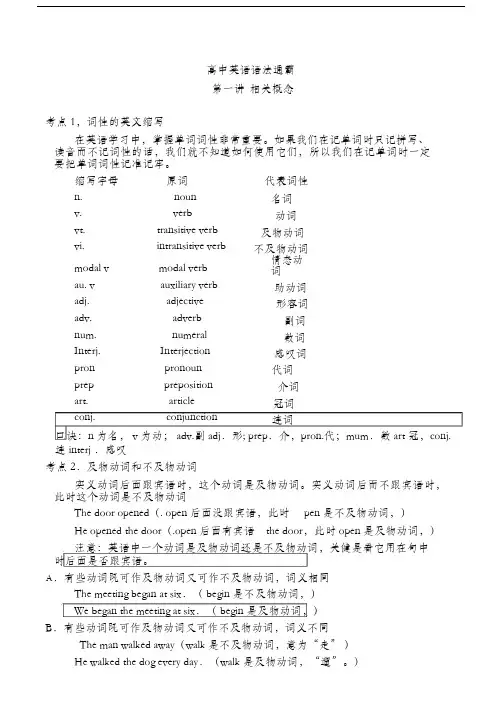
高中英语语法通霸第一讲相关概念考点 1,词性的英文缩写在英语学习中,掌握单词词性非常重要。
如果我们在记单词时只记拼写、读音而不记词性的话,我们就不知道如何使用它们,所以我们在记单词时一定要把单词词性记准记牢。
缩写字母原词代表词性n. noun 名词v. verb 动词vt. transitive verb 及物动词vi. intransitive verb 不及物动词modal v modal verb 情态动词au. v auxiliary verb 助动词adj. adjective 形容词adv. adverb 副词num. numeral 数词Interj. Interjection 感叹词pron pronoun 代词prep preposition 介词art. article 冠词conj. conjunction 连词口诀:n 为名, v 为动; adv.副 adj.形; prep.介,pron.代;mum.数 art 冠,conj.连 interj .感叹考点 2.及物动词和不及物动词实义动词后面跟宾语时,这个动词是及物动词。
实义动词后而不跟宾语时,此时这个动词是不及物动词The door opened(. open 后面没跟宾语,此时pen 是不及物动词,)He opened the door(.open 后面有宾语the door,此时 open 是及物动词,)注意:英语中一个动词是及物动词还是不及物动词,关健是看它用在句中时后面是否跟宾语。
A.有些动词既可作及物动词又可作不及物动词,词义相同The meeting began at six.( begin 是不及物动词,)We began the meeting at six.( begin 是及物动词,)B.有些动词既可作及物动词又可作不及物动词,词义不同The man walked away(walk 是不及物动词,意为“走” )He walked the dog every day.(walk 是及物动词,“遛”。
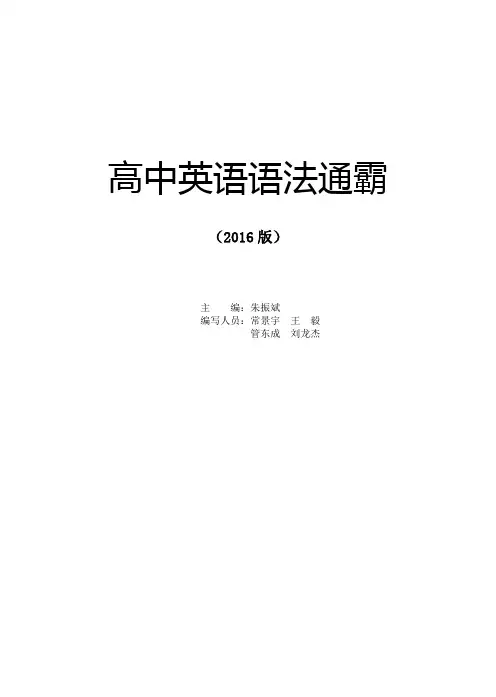
高中英语语法通霸(2016版)主编:朱振斌编写人员:常景宇王毅管东成刘龙杰前言有语言学家说过:“语言是语法化的词汇。
”也就是说,语言是按照语法规则组织起来的词汇。
一句话表达得是否正确,主要是看它是否符合语法规则;任何一个错句,都能从语法上找到原因。
因此,学好语法是学好一门语言的基础。
在当前的英语教学中,上面倡导要淡化语法教学,要重视学生综合应用能力的培养。
实施这么多年来,老师们普遍感到学生准确应用英语的能力下降了很多,特别是“写”的能力。
大部分学生写的英语作文“惨不忍睹”。
这实际上是淡化语法教学所产生的严重后果。
学习母语不学语法只要“浸泡”得多就能学好,但在我国英语毕竟是一门外语,连第二语言都不是,只靠“浸泡”而不通过学习语法知识来帮助理清规律,至少对于相当多的学生是不适用的。
一些没有学好语法的学生去美国上学,他们整天“浸泡”在英语环境中,“听”、“说”的能力提高了不少,但很多人“写”的能力却鲜有提高。
语法差的学生,总是感到自己的英语一塌糊涂。
许多学生英语从“差”中逆转过来,就是从学好语法开始的。
只有学好了语法,才能写出语法正确、句式灵活的句子来;只有学好了语法,才能读懂文章中的长难句;只有学好了语法,才能快速提高自己的“听”、“说”能力。
语法是什么?语法是帮助你解决“写”、“读”、“说”、“听”中遇到的困难的知识的总称,语法是指导你正确使用英语的精华知识。
但现在许多人都害怕英语语法。
一方面是因为现在盛行的教学理论在作怪,学校教学过于淡化语法教学,过于强调语言的“习得”,导致学生的语法基础较差。
另一方面,是因为没有合适的语法资料。
教材上的语法讲解,“千呼万唤始出来,犹抱琵琶半遮面”,总是放不下架子,就是讲一点,其深度比考试的难度要低得多,根本靠不住。
书店里的语法资料,一类是语法大家们编的,旨在解释一些语法现象,本来就不是给高中学生看的,有些知识学生看了没有用,有些知识学生根本看不懂。
再一类就是一些名校编的资料,由于编写有时间有限、稿酬是按编的页数给的,这类资料大部分粗制滥造,总是先笼统地讲解一下,再弄点题一凑就好了。
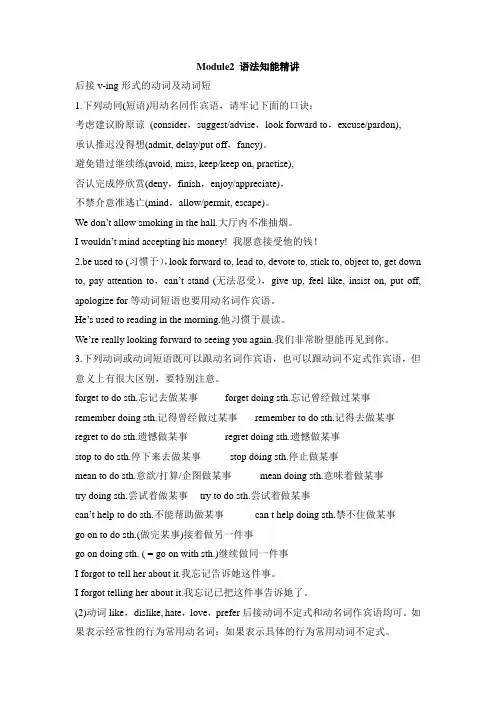
Module2 语法知能精讲后接v-ing形式的动词及动词短1.下列动同(短语)用动名同作宾语,请牢记下面的口诀:考虑建议盼原谅(consider,suggest/advise,look forward to,excuse/pardon),承认推迟没得想(admit, delay/put off,fancy)。
避免错过继续练(avoid, miss, keep/keep on, practise),否认完成停欣赏(deny,finish,enjoy/appreciate),不禁介意准逃亡(mind,allow/permit, escape)。
We don’t allow smoking in the hall.大厅内不准抽烟。
I wouldn’t mind accepting his money! 我愿意接受他的钱!2.be used to (习惯于),look forward to, lead to, devote to, stick to, object to, get down to, pay attention to,can’t stand (无法忍受),give up, feel like, insist on, put off, apologize for等动词短语也要用动名词作宾语。
He’s used to reading in the morning.他习惯于晨读。
We’re really looking forward to seeing you again.我们非常盼望能再见到你。
3.下列动词或动词短语既可以跟动名词作宾语,也可以跟动词不定式作宾语,但意义上有很大区别,要特别注意。
forget to do sth.忘记去做某事forget doing sth.忘记曾经做过某事remember doing sth.记得曾经做过某事remember to do sth.记得去做某事regret to do sth.遗憾做某事regret doing sth.遗憾做某事stop to do sth.停下来去做某事stop doing sth.停止做某事mean to do sth.意欲/打算/企图做某事mean doing sth.意味着做某事try doing sth.尝试着做某事try to do sth.尝试着做某事can’t help to do sth.不能帮助做某事can t help doing sth.禁不住做某事go on to do sth.(做完某事)接着做另一件事go on doing sth. ( = go on with sth.)继续做同一件事I forgot to tell her about it.我忘记告诉她这件事。
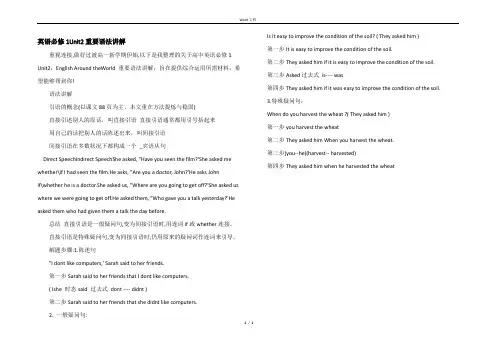
Word 文档1 / 1英语必修1Unit2重要语法讲解重视连接,做好过渡高一新学期伊始,以下是我整理的关于高中英语必修1 Unit2:English Around theWorld 重要语法讲解,旨在提供综合运用所需材料,希望能够帮到你! 语法讲解引语的概念(以课文88页为主,本文重在方法提炼与稳固) 直接引述别人的原话,叫直接引语 直接引语通常都用引号括起来 用自己的话把别人的话陈述出来,叫间接引语 间接引语在多数状况下都构成一个 _宾语从句Direct SpeechIndirect SpeechShe asked, "Have you seen the film?'She asked me whether\if I had seen the film.He asks, "Are you a doctor, John?'He asks John if\whether he is a doctor.She asked us, "Where are you going to get off?'She asked us where we were going to get off.He asked them, "Who gave you a talk yesterday?'He asked them who had given them a talk the day before.总结 直接引语是一般疑问句,变为间接引语时,用连词if 或whether 连接。
直接引语是特殊疑问句,变为间接引语时,仍用原来的疑问词作连词来引导。
解题步骤:1.陈述句"I dont like computers,' Sarah said to her friends.第一步Sarah said to her friends that I dont like computers. ( Ishe 时态said 过去式 dont ---- didnt )第二步Sarah said to her friends that she didnt like computers. 2. 一般疑问句:Is it easy to improve the condition of the soil? ( They asked him ) 第一步It is easy to improve the condition of the soil.第二步They asked him if it is easy to improve the condition of the soil. 第三步Asked 过去式 is ---- was第四步They asked him if it was easy to improve the condition of the soil. 3.特殊疑问句:When do you harvest the wheat ?( They asked him ) 第一步you harvest the wheat第二步They asked him When you harvest the wheat. 第三步(you --he)(harvest -- harvested)第四步They asked him when he harvested the wheat。
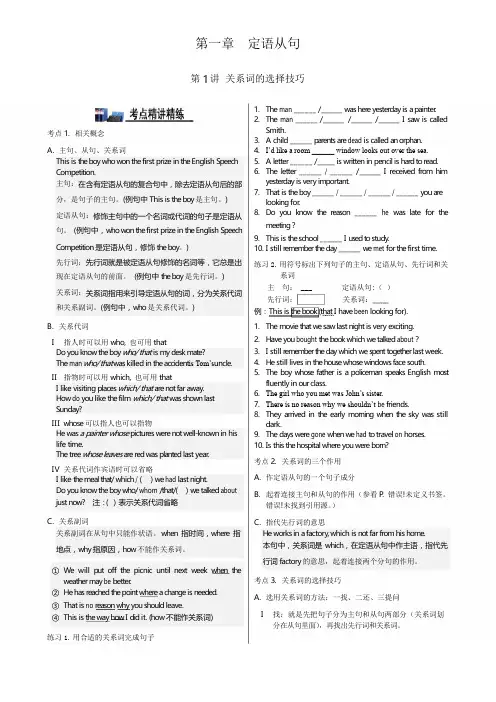
第一章定语从句第1讲关系词的选择技巧1.The man______/______was her e yesterday is a painter.2.The man______/______/______/______I saw is called考点1.相关概念A.主句、从句、关系词This is t he boy who won the first prize in the English Speech Competition.主句:在含有定语从句的复合句中,除去定语从句后的部分,是句子的主句。
(例句中This is t he boy是主句。
)定语从句:修饰主句中的一个名词或代词的句子是定语从句。
(例句中,who won t he first prize in t he English Speech Competition是定语从句,修饰t he boy。
)先行词:先行词就是被定语从句修饰的名词等,它总是出现在定语从句的前面。
(例句中t he boy是先行词。
)关系词:关系词指用来引导定语从句的词,分为关系代词和关系副词。
(例句中,who是关系代词。
)B.关系代词I指人时可以用who,也可用thatDo you know the boy who/that is my desk mate?The man who/that was killed in th e accident is Tom’s uncle. II指物时可以用which,也可用thatI like visiting places which/that are n ot far away.How do you like t he film which/that was shown last Sunday?III whose可以指人也可以指物He was a painter whose pictures were n ot well-known in his life time.The tree whose leaves are r ed was planted last year.IV关系代词作宾语时可以省略I like t he meal t hat/which/()we had last night.Do you know the boy w ho/whom/that/()we talked about just now?注:()表示关系代词省略C.关系副词关系副词在从句中只能作状语。
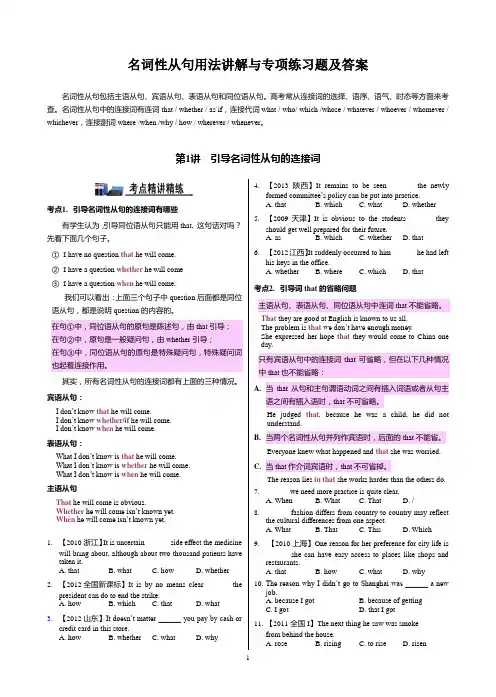
名词性从句用法讲解与专项练习题及答案名词性从句包括主语从句、宾语从句、表语从句和同位语从句。
高考常从连接词的选择、语序、语气、时态等方面来考查。
名词性从句中的连接词有连词that / whether / as if,连接代词what / who/ which /whose / whatever / whoever / whomever / whichever,连接副词where /when /why / how / wherever / whenever。
第1讲引导名词性从句的连接词考点1.引导名词性从句的连接词有哪些有学生认为,引导同位语从句只能用that, 这句话对吗?先看下面几个句子。
①I have no question that he will come.②I have a question whether he will come③I have a question when he will come.我们可以看出:上面三个句子中question后面都是同位语从句,都是说明question的内容的。
在句①中,同位语从句的原句是陈述句,由that引导;在句②中,原句是一般疑问句,由whether引导;在句③中,同位语从句的原句是特殊疑问句,特殊疑问词也起着连接作用。
其实,所有名词性从句的连接词都有上面的三种情况。
宾语从句:I don’t know that he will come.I don’t know whether/if he will come.I don’t know when he will come.表语从句:What I don’t know is that he will come.What I don’t know is whether he will come.What I don’t know is when he will come.主语从句That he will come is obvious.Whether he will come isn’t known yet.When he will come isn’t known yet.1.【2010浙江】It is uncertain ______ side effect the medicinewill bring about, although about two thousand patients have taken it.A. thatB. whatC. howD. whether2.【2012全国新课标】It is by no means clear ______ thepresident can do to end the strike.A. howB. whichC. thatD. what3.【2012山东】It doesn’t matter ______ you pay by cash orcredit card in this store.A. howB. whetherC. whatD. why4.【2013陕西】It remains to be seen ______ the newlyformed committee’s policy can be put into practice.A. thatB. whichC. whatD. whether5.【2009天津】It is obvious to the students ______ theyshould get well prepared for their future.A. asB. whichC. whetherD. that6.【2012江西】It suddenly occurred to him ______ he had lefthis keys in the office.A. whetherB. whereC. whichD. that考点2.引导词that的省略问题主语从句、表语从句、同位语从句中连词that不能省略。
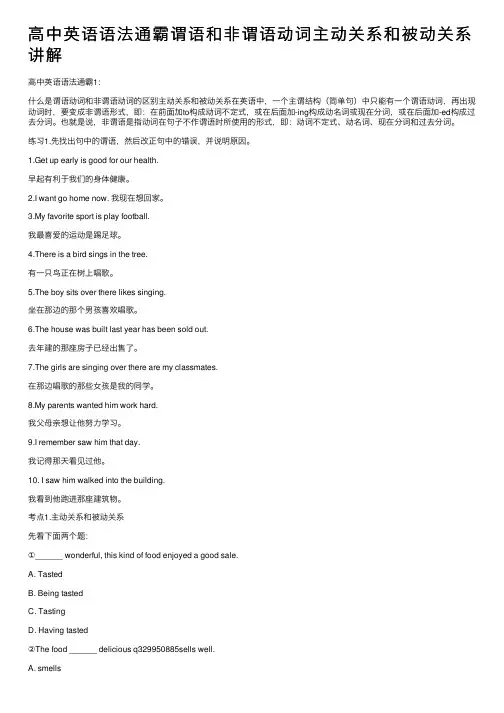
⾼中英语语法通霸谓语和⾮谓语动词主动关系和被动关系讲解⾼中英语语法通霸1:什么是谓语动词和⾮谓语动词的区别主动关系和被动关系在英语中,⼀个主谓结构(简单句)中只能有⼀个谓语动词,再出现动词时,要变成⾮谓语形式,即:在前⾯加to构成动词不定式,或在后⾯加-ing构成动名词或现在分词,或在后⾯加-ed构成过去分词。
也就是说,⾮谓语是指动词在句⼦不作谓语时所使⽤的形式,即:动词不定式、动名词、现在分词和过去分词。
练习1.先找出句中的谓语,然后改正句中的错误,并说明原因。
1.Get up early is good for our health.早起有利于我们的⾝体健康。
2.I want go home now. 我现在想回家。
3.My favorite sport is play football.我最喜爱的运动是踢⾜球。
4.There is a bird sings in the tree.有⼀只鸟正在树上唱歌。
5.The boy sits over there likes singing.坐在那边的那个男孩喜欢唱歌。
6.The house was built last year has been sold out.去年建的那座房⼦已经出售了。
7.The girls are singing over there are my classmates.在那边唱歌的那些⼥孩是我的同学。
8.My parents wanted him work hard.我⽗母亲想让他努⼒学习。
9.I remember saw him that day.我记得那天看见过他。
10. I saw him walked into the building.我看到他跑进那座建筑物。
考点1.主动关系和被动关系先看下⾯两个题:①______ wonderful, this kind of food enjoyed a good sale.A. TastedB. Being tastedC. TastingD. Having tasted②The food ______ delicious q329950885sells well.A. smellsB. smelledC. smellingD. is smelling⼀些同学分别选A和B。
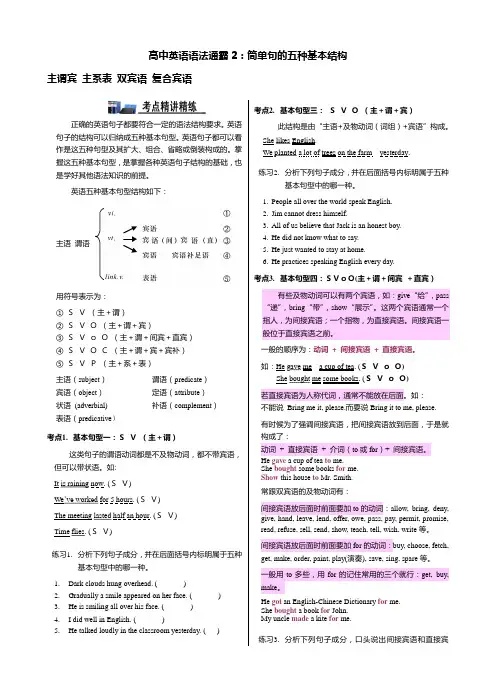
高中英语语法通霸2:简单句的五种基本结构主谓宾主系表双宾语复合宾语正确的英语句子都要符合一定的语法结构要求。
英语句子的结构可以归纳成五种基本句型。
英语句子都可以看作是这五种句型及其扩大、组合、省略或倒装构成的。
掌握这五种基本句型,是掌握各种英语句子结构的基础,也是学好其他语法知识的前提。
英语五种基本句型结构如下:主语谓语用符号表示为:①SV(主+谓)②SVO(主+谓+宾)③SVoO(主+谓+间宾+直宾)④SVOC(主+谓+宾+宾补)⑤SVP(主+系+表)主语(subject)谓语(predicate)宾语(object)定语(attribute)状语(adverbial) 补语(complement)表语(predicative)考点1.基本句型一:SV(主+谓)这类句子的谓语动词都是不及物动词,都不带宾语,但可以带状语。
如:It is raining now. (SV)We’ve worked for 5 hours. (SV)The meeting lasted half an hour. (SV)Time flies. (SV)练习1.分析下列句子成分,并在后面括号内标明属于五种基本句型中的哪一种。
1.Dark clouds hung overhead. ( )2.Gradually a smile appeared on her face. ( )3.He is smiling all over his face. ( )4.I did well in English. ( )5.He talked loudly in the classroom yesterday. ( ) 考点2.基本句型三:SVO(主+谓+宾)此结构是由“主语+及物动词(词组)+宾语”构成。
She likes English.We planted a lot of trees on the farm yesterday.练习2.分析下列句子成分,并在后面括号内标明属于五种基本句型中的哪一种。
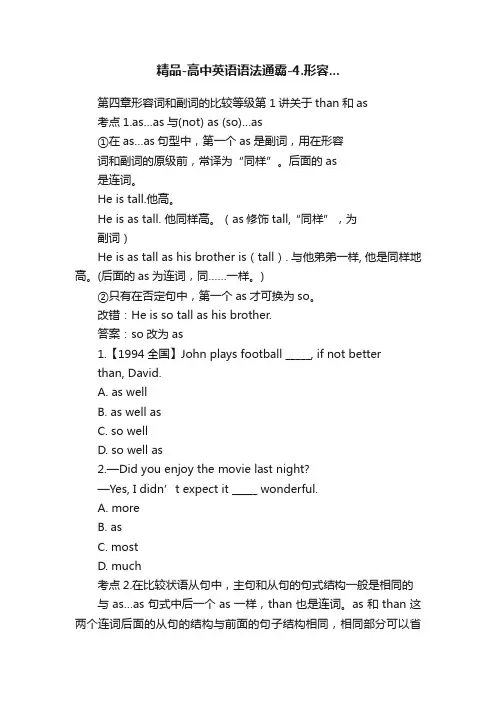
精品-高中英语语法通霸-4.形容...第四章形容词和副词的比较等级第1讲关于than和as考点1.as…as与(not) as (so)…as①在as…as句型中,第一个as是副词,用在形容词和副词的原级前,常译为“同样”。
后面的as是连词。
He is tall.他高。
He is as tall. 他同样高。
(as修饰tall,“同样”,为副词)He is as tall as his brother is(tall). 与他弟弟一样, 他是同样地高。
(后面的as为连词,同……一样。
)②只有在否定句中,第一个as才可换为so。
改错:He is so tall as his brother.答案:so改为as1.【1994全国】John plays football _____, if not betterthan, David.A. as wellB. as well asC. so wellD. so well as2.—Did you enjoy the movie last night?—Yes, I didn’t expect it _____ wonderful.A. moreB. asC. mostD. much考点2.在比较状语从句中,主句和从句的句式结构一般是相同的与as…as句式中后一个as一样,than也是连词。
as和than这两个连词后面的从句的结构与前面的句子结构相同,相同部分可以省略。
3.—What do you think of the plan?—It’s easier said tha n ______.A. carried outB. carrying outC. carry outD. to carry out4.To answer correctly is more important than ______.A. that you finish quicklyB. finishing quicklyC. to finish quicklyD. finish quickly考点3.谓语的替代(参看P. 错误!未定义书签。
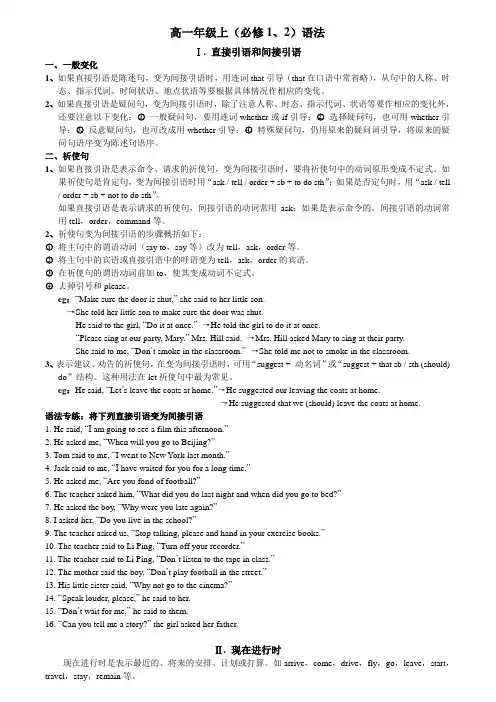
高一年级上(必修1、2)语法Ⅰ. 直接引语和间接引语一、一般变化1、如果直接引语是陈述句,变为间接引语时,用连词that引导(that在口语中常省略),从句中的人称、时态、指示代词、时间状语、地点状语等要根据具体情况作相应的变化。
2、如果直接引语是疑问句,变为间接引语时,除了注意人称、时态、指示代词、状语等要作相应的变化外,还要注意以下变化:○1一般疑问句,要用连词whether或if引导;○2.选择疑问句,也可用whether引导;○3.反意疑问句,也可改成用whether引导;○4.特殊疑问句,仍用原来的疑问词引导,将原来的疑问句语序变为陈述句语序。
二、祈使句1、如果直接引语是表示命令、请求的祈使句,变为间接引语时,要将祈使句中的动词原形变成不定式。
如果祈使句是肯定句,变为间接引语时用“ask / tell / order + sb + to do sth”;如果是否定句时,用“ask / tell / order + sb + not to do sth”。
如果直接引语是表示请求的祈使句,间接引语的动词常用ask;如果是表示命令的,间接引语的动词常用tell,order,command等。
2、祈使句变为间接引语的步骤概括如下:○1将主句中的谓语动词(say to,say等)改为tell,ask,order等。
○2将主句中的宾语或直接引语中的呼语变为tell,ask,order的宾语。
○3在祈使句的谓语动词前加to,使其变成动词不定式。
○4去掉引号和please。
eg:“Make sure the door is shut,” she said to her little son.→She told her little son to make sure the door was shut.He said to the girl, “Do it at once.”→He told the girl to do it at once.“Please sing at our party, Mary.” Mrs. Hill said.→Mrs. Hill asked Mary to sing at their party.She said to me, “Don’t smoke in the classroom.”→She told me not to smoke in the classroom.3、表示建议、劝告的祈使句,在变为间接引语时,可用“suggest + 动名词”或“suggest + that sb / sth (should)do”结构。
感顿市安乐阳光实验学校【三维设计】高中英语 Unit10 SectionⅡ语法讲座 The Right Price & Your Money专题练习北师大版必修4Ⅰ.用不定式改写下列句子1.I find that it is difficult to speak English well.→I find it difficult to speak English well.2.The boy got up earlier so that he might not be late again.→The boy got up earlier in order not to be late again.3.It seemed they were writing something for somebody.→They seemed to be writing something for somebody.4.It happened that they had known each other before.[→They happened to have known each other before.5.Jim doesn't know how he can improve his Chinese.→Jim doesn't know how to improve his Chinese.6.The progress which will be made soon is of great importance.→The progress to be made soon is very important.Ⅱ.用所给词的适当形式填空1.I saw him go (go) out of the room ten minutes ago.2.I'm thirsty; please get me something to_drink (drink).3.The teacher told them not_to_make (not make) so much noise.4.There isn't any difference between the two. I really don't know which to_choose (choose).5.In Asia, to_get (get) into a good public university, students have to take the entrance exam.6.Our aim is to_achieve (achieve) the task in six months.Ⅲ.单项填空1.________ a college student, you need to listen to your teachers and work hard in high school.A.Being B.To beC.Be D.Having been解析:选B。
高中英语语法通霸1 怎样选用形容词和副词区别功能考点1.形容词+ly变副词的规则(参看P.错误!未定义书签。
错误!未找到引用源。
)练习:写出下列形容词的副词形式clear extreme strong kindshy exact free latecalm polite recent normal usual careful wonderful special beautiful possible probable simple terrible happy angry easytrue casual cheerful mental考点2.根据句子成分选用形容词和副词常见的使用形容词的情况:作表语、定语、补语。
He is a careful boy.(作定语,用形容词)He is careful.(作表语,用形容词)You must keep your eyes closed. (作宾语补足语,用形容词)。
常见的使用副词的情况:修饰动词、形容词、副词和整个句子。
He writes carefully. He walks slowly.(认真地写,慢慢地走,修饰动词用副词)He is probably at home. 他很有可能在家里。
(联系:He is not careful. He is often late for school. not, often都是副词)This material is environmentally friendly.(修饰形容词用副词)He runs very slowly.(修饰副词slowly, 因此very是副词)Unfortunately, he lost all of his money.(修饰整个句子用副词)可简单归结为:形修名,表补定;副做状,修“副句形动”(可谐音记为“付诸行动”)。
Ⅰ. 用括号内词的形容词或副词形式的适当形式填空, 并说明为什么用这种形式。
第一章定语从句第1讲关系词的选择技巧考点1.相关概念A.主句、从句、关系词This is the boy who won the first prize in the English Speech Competition.主句:在含有定语从句的复合句中,除去定语从句后的部分,是句子的主句。
(例句中This is the boy是主句。
)定语从句:修饰主句中的一个名词或代词的句子是定语从句。
(例句中,who won the first prize in the English Speech Competition是定语从句,修饰the boy。
)先行词:先行词就是被定语从句修饰的名词等,它总是出现在定语从句的前面。
(例句中the boy是先行词。
)关系词:关系词指用来引导定语从句的词,分为关系代词和关系副词。
(例句中,who是关系代词。
)B.关系代词I指人时可以用who, 也可用thatDo you know the boy who/ that is my desk mate?The man who/ that was killed in the accident is Tom’s uncle. II指物时可以用which, 也可用thatI like visiting places which/ that are not far away.How do you like the film which/ that was shown lastSunday?III whose可以指人也可以指物He was a painter whose pictures were not well-known in his life time.The tree whose leaves are red was planted last year.IV关系代词作宾语时可以省略I like the meal that/ which / ( ) we had last night.Do you know the boy who/ whom /that/( ) we talked about just now? 注:()表示关系代词省略C.关系副词关系副词在从句中只能作状语。
精品-高中英语语法通霸-2.代词用法常考点分类专项总结归纳讲解与高考真题分类练习题及答案(word版可编辑修改)编辑整理:尊敬的读者朋友们:这里是精品文档编辑中心,本文档内容是由我和我的同事精心编辑整理后发布的,发布之前我们对文中内容进行仔细校对,但是难免会有疏漏的地方,但是任然希望(精品-高中英语语法通霸-2.代词用法常考点分类专项总结归纳讲解与高考真题分类练习题及答案(word版可编辑修改))的内容能够给您的工作和学习带来便利。
同时也真诚的希望收到您的建议和反馈,这将是我们进步的源泉,前进的动力。
本文可编辑可修改,如果觉得对您有帮助请收藏以便随时查阅,最后祝您生活愉快业绩进步,以下为精品-高中英语语法通霸-2.代词用法常考点分类专项总结归纳讲解与高考真题分类练习题及答案(word版可编辑修改)的全部内容。
第二章代词英语中的代词,按其意义、特征及在句中的作用分为九种:人称代词分为主格(如:I, you, he等)和宾格(如:me, you, him)物主代词分为形容性物主代词(如:my, his, your)和名词性物主代词(如:mine,his, yours)指示代词常见的有四个:this这,that那, these这些, those那些反身代词如:myself我自己,himself他自己,themselves他们自己疑问代词用在特殊疑问句中.有:who, whom, whose, what, which.如:Who is that boy?What do you like?不定代词如:some一些, many许多, both两个都, everything, everybody等关系代词引导定语从句.如:This is the boy who won the race.相互代词指each other 与 one another,意为“互相"连接代词疑问代词在引导从句时,都称为连接代词,包括who, whom, whose, what,which, whoever,whomever, whichever, whatever,一共九个。
高中英语语法通霸第一讲相关概念考点1,词性的英文缩写在英语学习中,掌握单词词性非常重要。
如果我们在记单词时只记拼写、读音而不记词性的话,我们就不知道如何使用它们,所以我们在记单词时一定要把单词词性记准记牢。
缩写字母原词代表词性n. noun 名词v. verb 动词vt. transitive verb 及物动词vi. intransitive verb 不及物动词modal v modal verb 情态动词au. v auxiliary verb 助动词adj. adjective 形容词adv. adverb 副词num. numeral 数词Interj. Interjection 感叹词pron pronoun 代词prep preposition 介词art. article 冠词conj. conjunction 连词考点2.及物动词和不及物动词实义动词后面跟宾语时,这个动词是及物动词。
实义动词后而不跟宾语时,此时这个动词是不及物动词The door opened.(open后面没跟宾语,此时pen是不及物动词,)He opened the door.(open后面有宾语the door,此时open是及物动词,)注意:英语中一个动词是及物动词还是不及物动词,关健是看它用在句中时后面是否跟宾语。
AThe meeting began at six.(begin是不及物动词,)We began the meeting at six.(begin是及物动词,)BThe man walked away(walk是不及物动词,意为“走”)He walked the dog every day.(walk是及物动词,“遛”。
)CHe listens to the music every day.(listen为不及物动词,而汉语中“听”是及物动词。
)DI don't know what to do.I don't know why/how/when to do.第一个向子是正确的,what是do的宾语。
第二个句子需要在do后加it.E.后面可直接跟宾语从句,但跟名词、代词等作宾语时,是不及物动词,要跟介词I think it's interestingWhat do you think of the filmI replied that I was unable to help them. 我回答说我帮不了他们He has not yet replied to my question. 他还没有回答我的问题He insisted that I (should) apologize to her. 他坚持我应该向她道歉。
He insisted on paying for the meal. 他坚持要付饭钱。
He insisted on immediate payment. 他坚持要求对方立即付款。
练习1.指出下列句中斜体动词的词性(及物动词填vt,不及物动词填vi)1. Most birds can fly .2. The children are flying kites in the park.3. It happened yesterday.4. My watch stopped.5. The baby stopped crying when he saw his mother.6. She spoke at the meeting this morning.7. Shall I begin at once8. She began working as a teacher after she left school.9. When did they leave Beijing10. They left last week.练习2改错1. He never dreamed of that one day he would become President2. What do you think the plan3. He never replied any of my letters4. He insisted staying up to nurse the patient.5. He entered into the classroom quietly.6. He will marry with her next month7.【2016全国II】My classmates and I are talking about how to do during the holiday考点3.实义动词、助动词与情态动词实义动词和助动词是根据动词在向子中的含义和作用来划分的,实义动词也叫行为动词A.实义动词指的是那些意义完全且能够独立作谓语的动词。
如He lives quite near.(live“住”,有明确的意义,单独作谓语,为实义动词,)I like reading.(like“喜欢”,意思明确,单独作谓语,为实义动词。
)I bought a pen yesterday.(buy“买”,意义明确,单独作谓语,为实义动词,)B.助动词助动词的“助”是“帮助”之意。
因此,助动词是指那些用来帮助构成时态、语态、虚拟语气、疑问向、否定句、倒装向和帮助强调的词。
这些词本身无词汇意义或意义不完全,不能单独作谓语.I. 帮助构成时态The boy is crying(is用来帮助构成现在进行时,和crying一起作谓语,是助动词。
)He has arrived.(has用来助构成现在完成时,和arrived一起作谓语,是助动词,)I have been painting all day.(have been用来帮助构成现在完成进行时,和painting起作谓语,都是助动词)II. 帮助构成否定句和疑问句Does he like English?(does帮助构成一般疑问句,没有具体意义,是助动词。
)He doesn’t have lunch at home.(does只是帮助构成否定句,没有具体意义,是助动词。
)III. 帮助构成被动语态Trees are planted in spring.(are帮助构成被动语态,没有具体意义,是助动词。
)The house has been pulled down.(has been帮助构成现在完成时和被动语态,是助动词。
)IV. 帮助构成虚拟语气If he had come yesterday, I wouldn't have made such a mistake.(had,have帮助构成虚拟语气,是助动词,属于谓语的一部分,)V.帮助构成倒装句So much did he love his mother that he bought her many presents on her birthday,(他如此爱他的母亲以至于他母亲生日那一天,他给地买了许多礼物,did只是助构成倒装句,没有具体意义,是助动词。
)VI.帮助构成强调意义的He did come yesterday.(他昨天确实来过,did起强调作用,没有具体意义,是助动词。
)C.一个词既可以作实义动词又可以作助动词时,具体是哪种,主要看它们在句中的功能He did his homework at seven o'clock. (did单独作谓语,意为“做”,是实义动词,)Did he do his homework yesterday(did是助动词,帮助构成一般疑问句,do是实义动词,意为“做”,是实义动词。
)He has had breakfast. (has是助动词,帮助构成现在完成时,had是实义动词,意为“吃”,has had一起构成了向子的谓语,)练习3.指出下列斜体单词是实义动词还是助动词1. Does ( ) he like ( ) swimming2. He does ( ) like ( ) swimming3. Where does ( ) he live ( )4. He does ( ) some washing after work5. He has ( ) had ( ) supper already6. The bridge has ( ) been ( ) built ( )now7. I have ( ) been ( ) waiting for you all day.8. He was ( ) struck ( )by a stoneD.情态动词情态动词同助动词一样,不能单独作谓语,要和实义动词一起作谓语。
因此,情态动词也称为情态助动词。
情态动词同基本助动词的区别在于,基本助动词本身无意义,而情态动词有自己的意义如: He can swim across the river.(can的词义为“能够”)You must stay at home.(must的词义为“必须”)I might leave tomorrow.(might的词义为“或许”)第二讲句子成分英语的句子成分主要有六种:即主语、谓语、宾语、定语、状语和补语。
(可以熟记为:主谓宾,定状补)除了这六种主要成分之外,还有“表语”和“同位语”的说法。
但表语和系动词一起作谓语,因此划分成分时,划分在谓语上。
同位语分为主语同位语和宾语同位语,属于主语或宾语的一部分。
考点1.划分句子成分时的常用符号英语中划分句子成分的符号主语在下面画直线谓语在下面画曲线宾语在下面画双横线定语在下面画虚线?(一行点使我们想到一排钉子,“钉”谐音为“定语”的“定”)状语下面为短横线(短横线使我们想到短木桩,木桩撞(状)钟)补语上一短横,下一短横(下一短横好像是为了弥补上面短横间的空隙)同位语上下双曲线(都有曲折,上下位置基本相同)考点1.主语主语是一个句子所叙述的主体,一般位于句首,通常由名词性的词来充当。
可以作主语的词性或语法结构:1. 名词2. 代词3. 数词4. 不定式5. 动名词6. 主语从句7. 名词化的形容词(如the rich)在英语中,形容词、副词和介词短语是不能作主语的。
如果它们在句首时,句子可能是倒装句,真正的主语在后面。
On the desk are some books. (主语是books,所以用are)Down jumps the boy. (主语是the boy,所以用jumps )Gone are the days. (主语是the days,所以用are)练习1.在下面句子的主语下面画横线,并说出由什么充当。